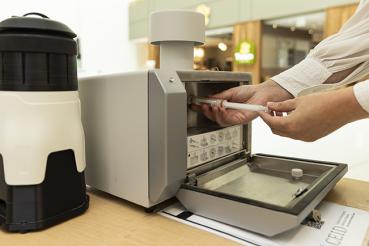Parenting is always a challenge, but parenting during a pandemic can be downright stressful. To help during this time, Rush Copley Medical Group pediatrician Nicole C. Keller, DO, provides answers to some of the questions on parents’ minds.
Is it safe to bring my child to the doctor?
Yes, with new safety measures in place, it is safe for your child to visit the doctor. These measures include prescreening for COVID symptoms, enhanced cleaning and required masks to prevent the spread of illness to you or anyone else in the community.
Is it necessary for me to bring my child in for a routine visit?
It is truly necessary and important because your child’s body is growing and changing all the time, and our goal is to prevent problems or catch them early. At well child visits, we check to see that your child is growing and developing appropriately.
Can vaccinations wait until I feel safer bringing my child in?
I strongly encourage you not to delay vaccines, especially during the pandemic. It is safe to bring your child in and important that you do so. You want your child to stay as healthy as possible in case of exposure to COVID and this means immunizations to prevent them from getting measles or polio or any of the other diseases they can be protected against. By doing so, you protect not only your child, but your community, too, since drops in immunity can result in outbreaks.
Do kids have specific COVID-19 symptoms?
What should I do if I think my child has symptoms? Children are likely to have mild symptoms that are more like a cold – typically fever, runny nose and cough and sometimes vomiting and diarrhea – and very similar to flu symptoms. If you think your child has COVID-19, call your pediatrician’s office to ask what to watch for and keep him or her away from others. For the most part, if the child is well-hydrated and responding well to Tylenol or Motrin, we monitor them at home. It your child gets worse or if symptoms persist beyond three to five days, call your doctor.
Should I still bring my child to the emergency room?
If your child has broken bones, lacerations, severe stomach pains or other symptoms that warrant emergency care, you should take him or her to the emergency room. Enhanced measures are in place to keep your care safe during COVID.
Is it safe to bring my child out shopping with me?
If you are going at a time when the store is not crowded and you are wearing masks or going to an outdoor market, the risks are lower. Keeping your child home is probably a better choice if you have that option, but if you don’t, be sure your child wears a mask and washes hands so you’re not bringing germs home.
How do I talk to my child about COVID without creating more anxiety?
For small children, you can talk about germs and why we wash our hands – it’s about keeping people healthy.
School-aged kids – teens and tweens – have a better understanding of how their decisions affect themselves and other people. Focus on the positive and give them a plan of action to help build their coping skills – like talking to you to destress or taking deep breaths or taking walks.
What about playdates? Are they safe?
Whether you arrange playdates for your child depends on your family’s comfort level and the efforts you take to minimize risks. Keep playdates as safe as possible by having children play outdoors, wear masks and be farther away from each other. I also recommend that the playmate be from a family that you trust to tell you if their child has had a cough or other symptoms. If your child has other medical conditions, this is something to carefully think about. Be cautious.
Is it okay for grandparents to watch the kids?
If the grandparents are relatively healthy and OK with the risks, talk to them and see how they feel about it.
My child is acting out more – more tantrums and talking back. Why and what can I do?
Kids pick up on what’s going on around them. If they see us getting stressed, they may be stressed and exhibit sleep or behavior problems or potty-training regression.
To address it, we need to reinforce positive behaviors. For small children, a sticker chart on the wall helps track good deeds, like sharing, cleaning up without being asked or trying new foods. Each of these behaviors earns a sticker and several stickers earn a reward, like a sweet treat, T-shirt or book. It helps motivate them and keeps the household more friendly.
You can also try adjusting the rules to reflect changes in daily routines during the pandemic. Be creative and flexible during this challenging time but it is still important to keep routines and good habits.
My older kids have picked up some bad habits, including more TV and video games. Is there a recommended amount of screen time for kids, and what can I do to change their behavior?
You should set limits for screen time – the American Academy of Pediatrics recommends two hours or less of screen time a day.
Let your kids budget their screen time, using it throughout the day or all at once. Try using some of your screen time for family time and watch or play together, then talk about what you’ve watched and ask your children about their favorite character or what they learned.
Turn off screens at least an hour before bedtime to de-stimulate brains.
We’ve been snacking more and eating more junk food. How do we get back to healthy eating?
Many of us are eating from boredom or stress. Get back to healthy eating gradually. Limit your kids to dessert once a day – or let them earn it using a sticker chart. Maximize healthy options. We keep a veggie tray with dip in our refrigerator – that way it’s always available and kids can choose what they want from the tray. Have your kids prepare a fruit or vegetable – something fun like peanut butter and celery with raisins. When my kids want a snack like Goldfish crackers, I’ll bring them a handful – along with a piece of fruit or a veggie, and they almost always eat the healthy choice, too.
Do you have other tips to help as the pandemic continues?
- Stay physically active with fun activities inside and outside.
- Go for walks, explore, play family games or sports, take nature walks.
- Eat balanced meals with lots of fruits and veggies.
- Set a routine sleep schedule
- Celebrate accomplishments!





